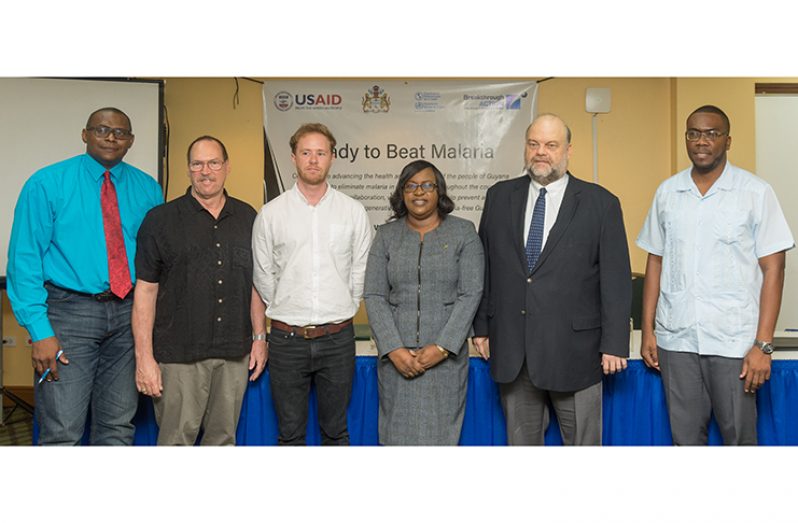– but still more work to be done, says US Ambassador
NOTABLE progress has been made in reducing the prevalence of Malaria in Guyana, however, cognisant of the need to do more, the Ministry of Public Health in partnership with the Pan American Health Organisation; Global Fund to Fight AIDS, Tuberculosis and Malaria; and the U.S Government is working to in introduce rapid diagnostic tests and treatment for malaria.
The USAID’s Breakthrough Action Project is intended to provide social and behavioural change support at a time when myths surrounding Malaria remains a hindrance in the fight to eliminate the disease.
Malaria, according to the Pan American Health Organisation/World Health Organisation (PAHO/WHO), is a disease caused by the parasite Plasmodium, which is transmitted by the bite of an infected mosquito.
On the sideline of a USAID’s Breakthrough Action Malaria Project Insights Validation Workshop at Cara Lodge on Thursday, THINK ACTION Representative, Rohan Doherty, said based on his interactions with persons in Regions Seven and Eight, there are many misconceptions and a clear lack of awareness of the disease.
MISCONCEPTION
“So there are a lot of misconceptions around people thinking that malaria comes from water, and drinking dirty water… or you could avoid malaria by eating healthy foods, and being physically healthy,” Doherty explained. He said the current situation presents an opportunity for increased awareness on precautionary measures.
It was noted too, that while there are volunteers conducting testing in many mining communities, those at risk were unaware.
“A lot of people in the communities like miners, camp managers, and others, do not realise that these trained malaria testers are in the area. They don’t know that these people are in their communities, offering these services free of cost. So there is an opportunity there to raise that awareness, so that people can get tested for free,” he said.
U.S Ambassador Perry Holloway, during the opening ceremony of the workshop, explained that under the Breakthrough ACTION Malaria Project, programmes will be designed to increase access to testing and treatment for malaria among miners and the surrounding communities.
Those initiatives will also identify the drivers of malaria transmission, and develop action plans to stop it. In addition to the ongoing project, the U.S Government is also supporting PAHO in its conduct of therapeutic efficacy studies.
Ambassador Holloway, noted that while Guyana has made “excellent progress” in reducing malaria, there is much more work to be done, and the ongoing projects are being designed to bring the numbers down. Between 2000 and 2015, there was a 58 per cent reduction in malaria cases.
PARTNERSHIP APPROACH
“The U.S Government is proud to partner in this workshop that will expand our shared understanding of experience from those most affected by this disease. The intention is that with technical and medical experts, and most importantly the participation and collaboration of the communities affected by malaria, we can create solutions to barriers that weaken malaria prevention efforts and delay testing and treatment,” Ambassador Holloway said.
He noted that as a collective, all stakeholders could help to develop tailored solutions to improve prevention and elimination responses in Guyana.
Minister within the Ministry of Public Health, Dr. Karen Cummings said Guyana remains committed to the fight to reduce and ultimately eliminate malaria.
“Of the 21 malaria-endemic countries in the Region of the Americas, Guyana is one of 18 which have committed to eliminating this disease by developing sustainably robust policies and strategies which are tailored to the needs of the country as well as the identified communities with vulnerable populations such as those with miners and loggers who are engaged in activities of economic benefit, mostly in the four hinterland regions of Guyana inclusive of Regions One, Seven, Eight and Nine,” the public health minister said.
Alluding to the work of the ministry, Minister Cummings noted that the National Malaria Programme is in the process of implementing a range of innovative interventions that target the delivery of services at the community level. One such strategy is building the capacity of miners and loggers in testing and treating themselves for malaria.
“Though this may seem a simple exercise to roll out, its success is subject to the influence of key determinants such as the perceptions, knowledge, attitudes, and practices of the targeted personnel,” she posited.
The minister within the Ministry of Public Health said conducting an analysis of the gaps that exist will help the ministry and its partners to decide on methods that would influence social and behavioural change.
Though the initiatives to root out malaria are predominantly funded by the government, she said the vision of a country free of malaria would not be possible without strong backing from the key partners like USAID, the Global Fund and PAHO/WHO.
The ‘Insights Validation Workshop’ was organised by the National Malaria Programme of the Vector Control Services (Public Health Ministry) in collaboration with the USAID and Breakthrough ACTION Guyana, which is being implemented by the John Hopkins University of Baltimore, U.S.A. Breakthrough Action is currently being rolled out in Regions Seven and Eight.


.jpg)











